Tag : Guest Blogger
September 23, 2013 by Rori Picker Neiss
Laws Aren’t Beautiful. People Are Beautiful.
 When I think of Rosh Hashanah, I am immediately struck by the drama of the Day of Judgment. I think of a time of introspection, of melodic prayers and inspiring poetry, of sweet foods eaten with family and close friends.
When I think of Rosh Hashanah, I am immediately struck by the drama of the Day of Judgment. I think of a time of introspection, of melodic prayers and inspiring poetry, of sweet foods eaten with family and close friends.
I do not think of sex.
That is, I never used to think of sex in relation to Rosh Hashanah, until a friend sent me an article which attempted to link the two. In an elegant and vivid piece, Merissa Nathan Gerson characterizes honey, a food prevalent as we celebrate the New Year, as the creative result of the unbridled sexual energy of the abstinent worker bees. Suddenly, dipping the apple in honey was no longer a simple act to symbolize a sweet new year.
Gerson takes her point further, though, comparing the abstinence of the bees to the abstinence practiced by Jewish couples who observe the laws of niddah, often translated (poorly, in my opinion) as “family purity” or sometimes “menstrual purity.” For couples who practice niddah, the laws prohibit intercourse approximately two weeks of every month– from when a woman sees the onset of her period until after she has counted seven days of absolutely no blood. For many, the laws also include prohibitions of sleeping in the same bed, any form of touch, and even passing items directly from one person to the other. This system, argues Gerson, causes the sexual energy to build up, giving couples a store of vivacity and enthusiasm that can be channeled into enhancing other areas of Jewish life.
“For Jewish couples that observe the laws of niddah, half the month is then reorganized, redirecting sexual energy into the community, into the work of protecting the “queen”—the sanctity of the Sabbath. During the periods of abstinence, this energy is used to perform acts of tikkun olam, study Torah, or generally apply oneself toward the greater good of the Jewish collective. While bees produce honey, I like to think of Jewish laws around sex as yielding something, too: a sweet substance that comes in the form of tzekadah, of building community, and making the world brighter through devotional practice.”
My challenges to this argument are almost too numerous to count. Are we incapable of making a beautiful Shabbat dinner when we are permitted to have sex? Do we assume that all our energy should be, or is, channeled to sex at other times of the month? Do we truly live in this binary in which we have a limited amount of energy that can either be applied towards sex or to improving the world? And, if so, do people who do not have prohibitions on having sex do less to improve the world around them? Do people who are not in relationships have a greater obligation of tikkun olam– repairing the world? Is there a way to measure our sexual energy to ensure that at times when we are niddah we are exerting the proper amount of energy into the Jewish community? Are pregnant women and nursing mothers who are amenorrheic exempt from contributing to the improvement of the world and the betterment of the Jewish community? Do we consider women who choose to skip periods using hormonal birth control methods also to be exempt, or would we still consider them obligated to apply themselves toward the greater good of the Jewish collective since their absence of a period is chemical? Or, like niddah, does one’s commitment to Torah study and tikkun olam only begin when one sees the flow of blood?
- 2 Comments
May 9, 2012 by Guest Blogger
My Writing Roots in Porn Lit
By Anonymous
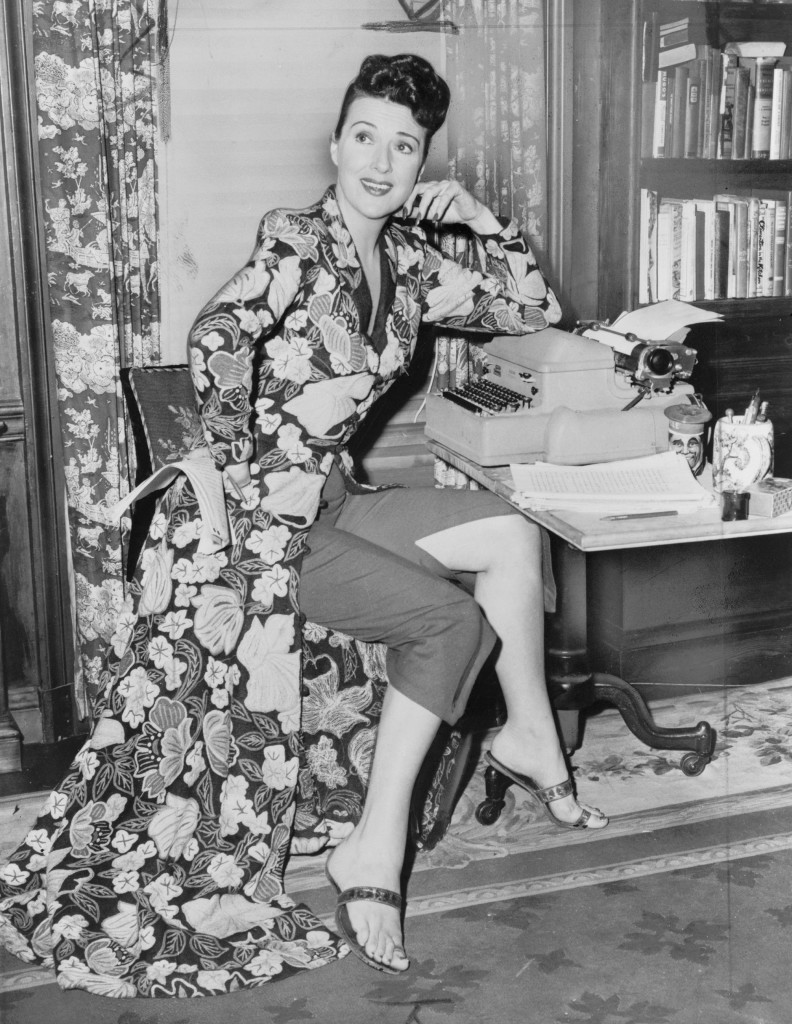
Gypsy Rose Lee seated at typewriter/ World Telegram & Sun photo by Fred Palumbo via Library of Congress.
The year was 1979. Ronald Reagan was in the White House, Leonid Brezhnev was in the Kremlin, and I had just tumbled, fresh-faced and clueless, from the idyllic confines of a Seven Sisters college in the mid-Hudson valley. I had a plan–graduate school at Columbia University in September–and my very first apartment, a shabby walk-up on 107th Street and Amsterdam Avenue, then a sketchy neighborhood just south of Harlem. But I needed an income, so I found a job as a waitress. On my first day I inadvertently charged one customer $14.60 for an iced coffee, splattered another with gobs of cheesecake from the slice I dropped, and was fired by the end of my shift. Time for plan B. I pored over the want ads in the Village Voice. Telemarketer? Nurse’s aide? Nothing clicked until I read this one:
STAFF WRITER
ADULT FICTION
I called the number and spoke to a woman who was far more interested in my typing skills than my literacy. She told me to write the first chapter of School Girl Crush, a playful, Sapphic romp set in an East Coast boarding school. “It should be around 20 pages long,” she said. “And it shouldn’t take more than four hours.” I’d written a lot of term papers over the past few years, but I had never churned out 20 pages in four hours. Then I thought: East Coast? Girls’ school? Hey, I was a natural. I conjured my own college campus: the scenic pond—where I had three characters go skinny dipping—and the gym’s communal showers—where two others had a passionate, lesbian encounter—and pretty soon, the chapter was written. The next day, I sat across a desk from Flo, a zaftig middle-aged woman with a head of corkscrew ringlets and a big, toothy smile. As she read my chapter, the smile got even bigger. “This,” she said, “is perfect. When can you start?”
- No Comments
May 8, 2012 by Guest Blogger
A Conversation with Alix Kates Shulman

Alix Kates Shulman has been a passionate feminist voice for over 40 years, bringing to light questions of marital parity and other front-line issues of women’s rights in her memoirs and other nonfiction. Beginning with her first novel, the now- classic Memoirs of an Ex-Prom Queen, Shulman’s fiction has been praised for its wit, insight, and compassion. She is a past contributor to Lilith—the 1993 article “Gentiles and Jews at the Hop” and, most recently, an excerpt from her 2008 memoir To Love What Is. Readers will welcome this spring’s back-to-back publications, A Marriage Agreement and Other Essays and the novel Menage,“a brilliantly wry and entertaining comedy of desires” (Booklist), that is “delightfully wicked” (Kirkus).
In your sharp and funny new novel Ménage, Heather McKay is a stay-at-home mother and, for most of the novel, a would-be writer who puts up with her husband’s affairs in exchange for the extravagant and trouble-free life he gives her. Yet when Mack brings a notable dissident writer to live with them, she is bold in her seduction of him, as if she has nothing to lose. What drives her?
What drives her is a combination of literary ambition and ambivalence about the status of stay-at-home moms. Also, since Mack roams freely in the world while she’s lonely at home, she’s angry at him for his affairs and feels no qualms about having one herself. Ambivalence concerning both stay-at-home and working mothers is something that does not go away—note its renewed flare-up over Ann Romney. A recent Nation column by Katha Pollitt has the best analysis of that conundrum I’ve seen in ages.
- No Comments
April 23, 2012 by Guest Blogger
Green? Or Greeneh? Some Earth Week Reflections

Photo via Library of Congress Flickr stream
Growing up, green was the color of the aluminum siding on our house and of our painted garage, teeming with a full assortment of scrap—wood, metal, plastic, heavy paper and anything else that might somehow serve a future purpose. Green was the color of the lawn I often mowed, watered only when needed and early in the morning. My Girl Scout uniform was green. And so were the glasses filled with warm tea left out every morning for me and my sisters, the intentional love-filled leftovers from the big stove-cooked pot of tea our Dad filled his Thermos from each day before heading to his job at Gleason Works in our boat-sized American-made Chevy Impala, which he could fix himself.
Green was a shade of envy, too. Envy of the kids whose sandwiches were packed in throwaway Ziploc bags instead of bulky Tupperware that had to be schlepped home. Envy of all the other moviegoers, who got to socialize while waiting on line for buttered popcorn while we rustled through an over-stuffed tote to access a re-used plastic bag full of white kernels, air-popped at home. Envy of my friends whose families hired plows to remove their snow while we bundled up in hand-me-down snowsuits and shoveled all day.
It was envy of my classmates and friends whose parents had gone to college, didn’t have accents and weren’t mistaken for grandparents… and it was envy of those who had grandparents.
- No Comments
March 2, 2012 by Guest Blogger
An interview with Lilith magazine’s Editor in Chief
Cross-posted with Kosher Salt.
Anyone who read Freakonomics remembers the chapter on how a person’s name can pre-determine their future. If that frightening piece of incredible parental pressure got you thinking about the name game, Susan Weidman Schneider, editor of Lilith magazine, has plenty more to say on what’s in a name and the latest issue of the mag.
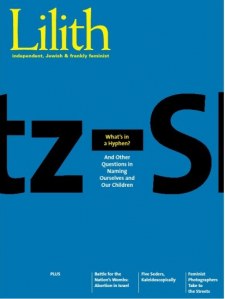
KS: What’s the greatest perk/biggest obstacle in working as editor of an independent, Jewish and frankly feminist magazine?
SWS: Editing Lilith magazine, now celebrating its 35th year, is a treat. The writers are wonderful, the ideas new and stimulating, and the end product is, I hope, insightful and always a good read—whether it’s in print, on the web via our soon-to-appear digital edition, or on the lively Lilith blog.
KS: What do you think is the most impactful topic that Lilith has covered?
SWS: That’s a tough one. The major issues Lilith has opened up have been topics like violence in Jewish families; Jewish women’s philanthropy and our relationship to money; Jewish hair—a sellout issue by the way; rabbinic sexual misconduct; new rituals and celebrations for the Jewish calendar and for the landmarks of our lives.
The last couple of Lilith salons at Sixth & I were really dynamite, and they dealt with cover stories that, like the what-we-call-ourselves story in Lilith’s current issue, resonate in our lives. One salon had to do with an article on breaking up over food. We spent about three hours in spirited discussion about what we eat, why it can sometimes be schismatic, what food represents in a relationship, and more. The second salon focused on what we wear. You can imagine! The talk ranged from our favorite garments to how we want to present ourselves to the world as feminists, as Jews, as professionals. Clothing is a powerful signifier, and we really mined that territory in our conversation.
- No Comments
February 17, 2012 by Guest Blogger
Spinoza and Cherry Ames
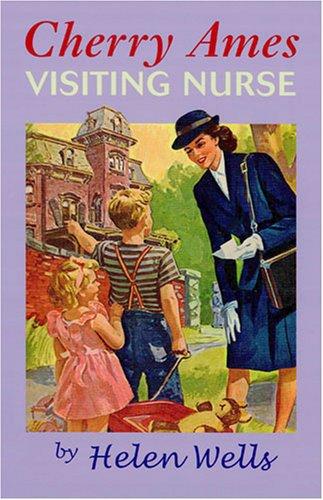 Like so many people who harbor secret sins and obsessions, I thought I was alone. And then one day, in the midst of a conversation, no doubt about high-level theological issues (or maybe where to go for lunch), with my friend and rabbinic colleague, Leah, I blurted it out: “did you ever read Cherry Ames when you were young?” She looked startled for a moment, and then responded, “I LOVED Cherry Ames!” Turns out, she and I are not the only ones who did (and do).
Like so many people who harbor secret sins and obsessions, I thought I was alone. And then one day, in the midst of a conversation, no doubt about high-level theological issues (or maybe where to go for lunch), with my friend and rabbinic colleague, Leah, I blurted it out: “did you ever read Cherry Ames when you were young?” She looked startled for a moment, and then responded, “I LOVED Cherry Ames!” Turns out, she and I are not the only ones who did (and do).
When I was a child, Cherry Ames was a favorite. Although I also read the Bobbsey Twins and Anne of Green Gables series, Cherry was the standout. Was it her black curly hair (like mine?) Was it her feisty independence? Was it her ability to solve every problem, not only of the medical variety, but mysteries of every kind? Was it her cute bedroom furniture in her home town of Hilton (Illinois)? Although I never expressed an interest in being a nurse, the Cherry Ames series (23 volumes in all), which portrayed a young woman who seemed to have a new doctor “suitor” in every book, yet always moved on to a new job leaving the would-be boyfriend behind, surely must have had some career-inspiring influence on me.
Somehow, unlike my Pee Wee Reese doll, several of my Cherry Ames books survived through adulthood. And I managed to find the remaining ones in second-hand bookstores and eventually on the Internet.
- 10 Comments
February 7, 2012 by Guest Blogger
Peach Fuzz Lishma (for its own sake):(“Peaching, Not Preaching”)
 Who picks peaches in August? Certainly not people like me, a rabbi who always anticipated the Jewish High Holidays by beginning to think about writing sermons as early as May. And by August – don’t ask!
Who picks peaches in August? Certainly not people like me, a rabbi who always anticipated the Jewish High Holidays by beginning to think about writing sermons as early as May. And by August – don’t ask!
But this year is different – now I’m semi-retired (and my husband retired 6 months earlier) and we are out on a weekday (!) in August picking peaches at Larriland Orchard in the countryside not far (but very far psychologically!) from D.C. Perfect sunny day, not humid, breathable air unlike much of the rest of the summer.
The two young women who are handing out the baskets for peach retrieval explain how to select the best peaches. No green on the flesh, a little hard (they’ll ripen in 3-5 days), these rows over here, not the ones farther back. For a born-and-bred city girl like myself, these directions are invaluable. And next to apples (for which I’ll return in a month), peaches are the easiest fruit to pick. The basket fills quickly, long before I’m tired or bored.
As we return to the vending stand to pay for our peaches, we find the two young women (interns? members of the family?) discussing the problem of their sensitivity to peach fuzz, how their constant exposure causes a kind of allergic reaction. Who knew?
Returning to the car, I begin contemplating this phenomenon, heretofore unbeknownst to me. Peach fuzz… the dark side of nature… environmental hazards?.. and suddenly, I realize what I’m doing. I’m thinking “sermon”; how can I possibly use this anecdote in a sermon?
- 7 Comments
January 26, 2012 by Guest Blogger
Beit Shemesh, Religious Extremism, and the Dignity of Women: Some Lessons from History
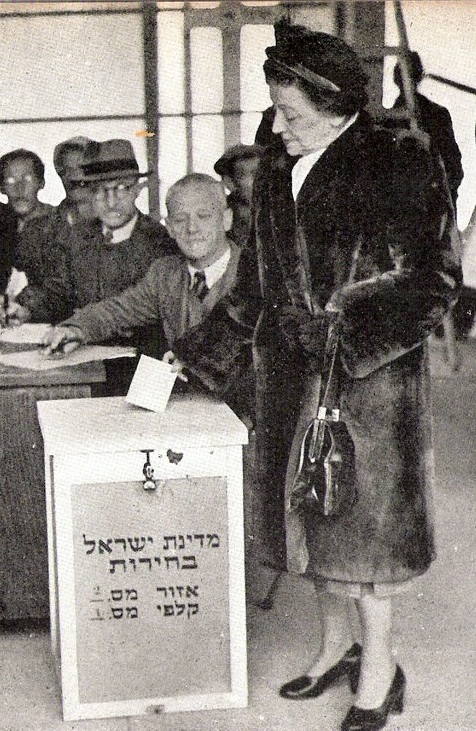
Vera Weizmann voting in Israel's first elections
The recent contretemps in Beit Shemesh riveted the Israeli public and brought worldwide attention to the misogynistic treatment accorded women in the public square by certain sectors of ultra-Orthodox Israeli society. As is by now well-known, some ultra-Orthodox Jews there hurled insults and engaged in bullying an eight-year-old Orthodox girl named Naama Margolese for dressing “immodestly” on her way to school. These same Jews also rioted when public street signs situated in an area inhabited by a population of ultra-Orthodox, Orthodox, and secular Jews that instructed women to dress according to their particular standards of modesty were removed. In recent months, ultra-Orthodox sensibilities have also led to the creation of bus routes where women are segregated and consigned to the back of the bus. On some public ceremonial occasions, women have been prohibited from singing lest their voices offend male listeners and on other occasions when women have sung there has been the spectacle of rabbis placing their hands over their ears to block out their sound. These episodes of Jewish religious extremism unconscionably objectify women and are absolutely incompatible with the democratic and egalitarian values upon which the State of Israel was founded.
This is not the first time such conflict between sectors of the ultra-Orthodox community and the other Jewish citizens of the State of Israel has been manifest. Indeed, such clashes predate the State itself. The ways in which secular and especially Orthodox religious leaders spoke out and acted in those cases provide models for how I would hope that present-day Israeli and Jewish religious leaders would respond to the concerns these events in Beth Shemesh and elsewhere evoke.
- 3 Comments
January 20, 2012 by Guest Blogger
A Call for Civility for ALL Israeli Citizens
 About a month ago I left Israel for a 10-day vacation, only to discover upon my return that it had become a different Israel. Gender segregation, an issue that NCJW has been involved in for years (e.g., Women of the Wall, the segregation on public buses, and the rights of agunot) had become front-page news with the story of Naama, a young child in Beit Shemesh taunted for her “immodest dress” by ultra-Orthodox zealots. Suddenly, it was the piece of news about which everyone — from Hillary Clinton to Prime Minister Netanyahu — was speaking.
About a month ago I left Israel for a 10-day vacation, only to discover upon my return that it had become a different Israel. Gender segregation, an issue that NCJW has been involved in for years (e.g., Women of the Wall, the segregation on public buses, and the rights of agunot) had become front-page news with the story of Naama, a young child in Beit Shemesh taunted for her “immodest dress” by ultra-Orthodox zealots. Suddenly, it was the piece of news about which everyone — from Hillary Clinton to Prime Minister Netanyahu — was speaking.
My own daughter, an officer in the Israel Defense Forces, was on her way home on leave when she was spat on and called names by an ultra-Orthodox zealot at a bus stop in Jerusalem. This is not a new phenomenon. What is new is that now, finally, the secular population is realizing that such incidents are not only about what “they” do in their own communities, but rather a symptom of the political system that has allowed religion to become part and parcel of civil government and civil society. The request of Haredi soldiers not to have to listen to women soldiers singing in an army choir is a perfect example of a system — put into place with good intentions — that has gone wrong. What if secular soldiers refused to listen to the Kiddush (blessing over the wine) at Friday night Shabbat meals? Or, if Druze soldiers demanded bread to be served alongside matzah on Pesach? Would that be respected as well?
I remembered when many years ago, the Ponovitch Rav, the great spiritual and intellectual leader of Lithuanian Judaism (the non-Hasidic branch of Haredi Judaism) came from Israel to Miami, where I grew up. My father went with my mother, both without head coverings, to pick him up at the airport. My mother, out of respect for the Rav, who was then old and frail, immediately took a seat in the back of the car, in order to allow the Rav to sit up front with my father. “Absolutely not,” declared the Rav, “I would never separate a husband and wife.” And so the great Rav sat in the back of the car with my mother in front alongside my father.
- 3 Comments
November 15, 2011 by admin
Riding the Buses in Jerusalem
Cross-posted with The NCJW Insider.
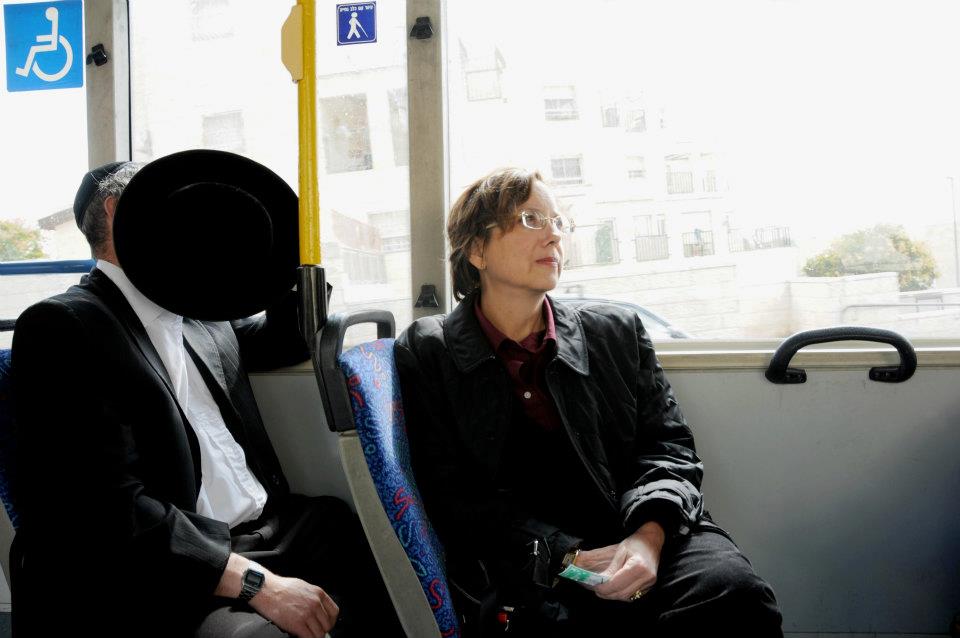
Photo Courtesy of NCJW
I am writing from Jerusalem where I am on a study tour with 23 women from the National Council of Jewish Women. We are here visiting some of the organizations we fund through our Israel Granting Program and also are meeting with a variety of people to get updates on the social, political, and economic issues facing the modern State of Israel. One issue I never quite thought I would experience in 2011 is bus segregation. No, I am not referring to blacks and whites because, after all, this is not 1960 in Mississippi. I am referring to gender segregation of men and women on buses with routes originating from the predominately Orthodox neighborhood of Ramat Shlomo in Jerusalem. Today, we rode the buses to experience firsthand what it is like to be a woman and assume you must “go to the back of the bus” when you board bus #56 or #40.
This now illegal activity started in 1997 when public transport companies began to operate special bus lines for the Haredi public, starting with two lines in Jerusalem and Bnei Barak. Called “Mehadrin” (extra kosher) lines, women would board the bus through the rear door and men would board through the front door. Women who objected to these rules would be subjected to harassment and intimidation and, in some cases, physical violence. The Israel Reform Action Center (IRAC) began to take action on this subject in 2001 and NCJW followed soon after. During a hearing on the case in January 2008, the Israeli Supreme Court criticized the manner in which gender segregation was being carried out on the buses and instructed the Ministry of Transportation to appoint a committee to study the matter. The Committee submitted its conclusions in October 2009 and found that bus routes applying gender segregation were unlawful given existing laws of the State of Israel; however, “segregation” was not defined and no enforcement mechanisms were put in place. The court has since ruled that signs must be placed in buses stating: “Due to Supreme Court ruling 47607 people can sit anywhere they want on the bus.”
- 1 Comment
 Please wait...
Please wait...